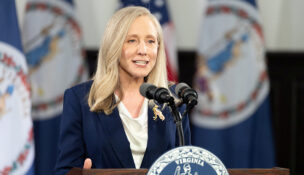Unfinished business
Mason Adams //June 29, 2023//
The tone of the 2023 General Assembly can be encapsulated in its approach to electricity rates. With dozens of lawmakers poised to retire, the General Assembly passed a major energy law, giving the State Corporation Commission added leeway over adjusting customer rates for utilities Dominion Energy Inc. and Appalachian Power.
Yet, at the same time, lawmakers couldn’t agree on filling two vacancies on the State Corporation Commission’s three-member board — the very regulatory body to which they’d just granted additional power.
That was the 2023 General Assembly in a nutshell: The body passed numerous consequential laws taking effect this month, but its partisan split left a significant amount of unfinished business that highlights the importance of November’s legislative elections. The General Assembly’s unresolved issues this session include commercial marijuana sales, tax reform, and funding levels for public education.
By mid-June, lawmakers had yet to reach a deal on amendments to the budget for the new fiscal year beginning July 1. As a result, funding levels remained uncertain for new and existing state programs, not to mention leaving counties and cities with budgetary holes.
“They did pass the ‘skinny budget,’ so there is a stopgap measure, which provides some dependability,” Barry DuVal, president and CEO of the Virginia Chamber of Commerce, said in May. “But think about what’s unresolved: funding for business-ready sites, expansion of lab schools, improvements to housing and affordability, what kind of deposits [are] going to be made in the unemployment trust fund. We look to the budget process to complete these important programs and invest in them.”
Lawmakers did make significant progress this year on legislation affecting education and workforce development, DuVal says. Foremost was a bill to consolidate Virginia’s $485 million patchwork of workforce development efforts — spread across six Cabinet secretaries, 12 state agencies and 35 programs — under the banner of the newly created Department of Workforce Development and Advancement.
He also commended lawmakers on taking steps to address child care and early childhood learning, although more concrete action was left for later.
Lawmakers also endorsed funding to develop industrial sites for megaprojects, although funding was part of the uncertain budget process. The Southeastern U.S. has become a hotspot for electric vehicle and battery factories, with plants announced for Georgia, Kentucky, North Carolina and Tennessee — but not Virginia.
“We’re hoping to have hundreds of millions of new money for site readiness,” DuVal says. “We believe this will be a huge step forward in making Virginia competitive.”
Gov. Glenn Youngkin’s spokeswoman, Macaulay Porter, cited progress toward site development as one of the 2023 session’s accomplishments, in a statement sent to Virginia Business. She also named utility regulation reform, restrictions on farmland landownership by foreign governments, and investments in agricultural technology. Yet there’s still unfinished business.
“While there was much accomplished,” Porter said in May, “the governor has been clear that Senate Democrats need to come to the table to provide a budget that provides $1 billion in tax relief for Virginians and delivers over $2.6 billion for our shared goals of job growth, public safety, education excellence, conservation of the Chesapeake Bay, and behavioral health services.”
The uncompleted budget created much uncertainty for funding priorities ranging from teacher salaries to an inland port for Southwest Virginia. It was also unclear as of early June whether lawmakers would back Youngkin’s proposal to invest $10 million to create the Virginia Power Innovation Fund, including $5 million to develop a small modular nuclear reactor in Southwest Virginia.
The legislature appeared unlikely to approve Youngkin’s proposed corporate tax cuts, although Democrats seemed willing to make smaller adjustments for individual taxpayers.
“The lowering of personal income tax rates and the lowering of corporate tax rates would have sent a strong signal to Virginians, personally and businesswise, that Virginia is going to remain competitive. Some of our drop in business rankings is due to tax reform in other states,” DuVal says, referring to the state’s drop from No. 1 to No. 3 in CNBC’s 2022 America’s Top States for Business.
Then there’s the question of marijuana, previously legalized in Virginia for medical and recreational use. While medical regulations and a distribution system have been finalized for years, the shift from a Democratic majority to a divided General Assembly has frozen the creation of a recreational market. Meanwhile, officials note, an untaxed, unregulated black market continues to thrive.
“The question is no longer whether or not [cannabis] should be legal for adults in the commonwealth. That was asked and answered in 2021,” says J.M. Pedini, director of Virginia NORML, the state chapter of the National Organization for the Reform of Marijuana Laws. “What the General Assembly and Gov. Youngkin must now decide is for how long they will continue to choose ceding control of Virginia’s marijuana market to illicit operators.”
In the meantime, lawmakers passed legislation to crack down on otherwise legal hemp products that contained THC, the active ingredient in marijuana that causes intoxication. Gentry Locke Consulting, a Richmond lobbying, marketing and strategic communications firm led by former state Del. Greg Habeeb, represented several of the state industry’s larger players, who “hated every version of the hemp bill they saw,” Habeeb says, “including the final version.”
The original bill passed by the General Assembly would have eliminated the entire industry, he says. Youngkin’s amendments, which replaced the legislature’s 2-milligram cap on THC with a less restrictive CBD-THC ratio, will instead kill “60% or 70%” of the industry, Habeeb quips.
Nonetheless, the legislature still made some major decisions this year.
Lawmakers killed bills to allow a casino referendum vote in Petersburg and to ensure paid sick days for both private and state employees. And they approved a measure to fold Eastern Virginia Medical School into Old Dominion University, although funding for startup costs — possibly up to $10 million — was left up in the air as of mid-June due to the lack of a budget deal.
Related Story
‘A generational shift’: Retirements, redistricting will remake legislature
i


















